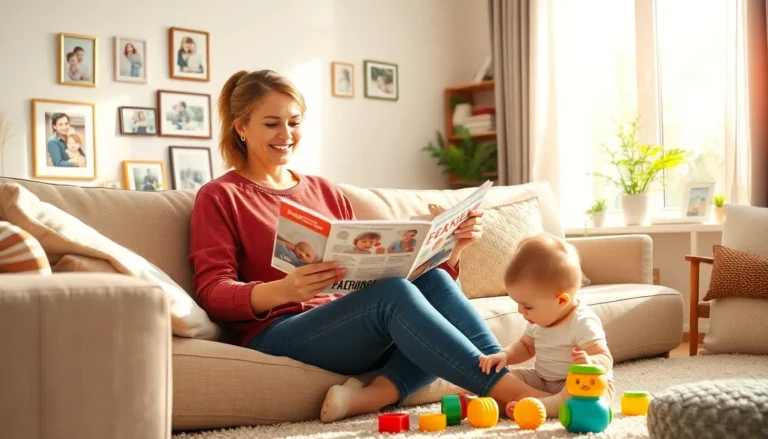Table of Contents
ToggleIn a world overflowing with possessions and distractions, minimalism offers a refreshing escape. This lifestyle encourages individuals to declutter not just their homes, but also their minds, focusing on what truly matters. However, embracing minimalism isn’t always a smooth journey. It presents unique challenges that can test one’s resolve and commitment.
From overcoming emotional attachments to items to navigating societal pressures, the path to minimalism can be fraught with obstacles. Many find themselves wrestling with the balance between simplicity and practicality. Understanding these challenges is crucial for anyone looking to adopt a minimalist lifestyle, as it paves the way for a more intentional and fulfilling existence.
Understanding Minimalism Challenges
Minimalism encompasses a lifestyle choice centered on simplicity and intentionality in both possessions and experiences. Recognizing and addressing challenges associated with minimalism fosters a more effective and rewarding journey toward this lifestyle.
Definition of Minimalism
Minimalism refers to the practice of intentionally reducing physical possessions and mental clutter to focus on essentials. It prioritizes quality over quantity, emphasizing meaningful connections and experiences. By eliminating distractions, individuals create space for creativity, mindfulness, and personal growth, ultimately enhancing overall well-being.
Common Minimalism Challenges
- Emotional Attachment: Individuals often face difficulties in letting go of items tied to memories, leading to potential clutter.
- Societal Pressures: External expectations and norms can create tension when shifting to a minimalist lifestyle, causing self-doubt.
- Practicality vs. Simplicity: Balancing functional needs with minimalist ideals poses challenges in everyday decision-making.
- Fear of Missing Out: Possessions often symbolize security or status, making it difficult to embrace minimalism fully.
- Sustainability Concerns: Navigating sustainability in minimalism requires careful selection of items, which can complicate the process.
Personal Experiences with Minimalism Challenges

Individuals pursuing minimalism often share their experiences, including both successes and valuable lessons learned. These personal stories highlight the transformative impact of adopting a minimalist lifestyle amidst various challenges.
Success Stories
Many people report significant improvements in their lives after embracing minimalism. One individual successfully reduced their belongings by 75% within a year, leading to a more organized living space and enhanced productivity. Another person, after downsizing their wardrobe, found it easier to get dressed each morning, resulting in reduced decision fatigue. Furthermore, families who embraced minimalism experienced deeper connections, as reduced clutter facilitated more quality time together. These success stories illustrate how overcoming challenges can lead to a more intentional and fulfilling life.
Lessons Learned
Individuals often learn critical lessons during their minimalist journey. They realize that emotional attachment to items can hinder progress, prompting them to assess the true value of their possessions. Many discover that societal pressures are less influential than initially believed, enabling them to prioritize personal values over others’ expectations. Additionally, individuals learn to balance simplicity with practicality by finding multipurpose items rather than adhering to strict minimalist standards. Adapting a mindset that embraces flexibility in minimalist practices fosters resilience, making the transition smoother and more sustainable.
Overcoming Minimalism Challenges
Embracing minimalism presents unique challenges that require tailored solutions. Practical strategies and effective mental frameworks support individuals in navigating these obstacles successfully.
Practical Strategies
- Set Clear Goals: Establish specific, measurable objectives for decluttering. For instance, aim to reduce belongings by 20% within a set timeframe.
- Create a Decluttering Schedule: Designate specific days each month for tackling different areas. Following a consistent timeline fosters accountability and progress.
- Implement the One-In-One-Out Rule: Commit to removing one item for every new item acquired. This method helps maintain a balanced living space.
- Prioritize High-Value Items: Focus on decluttering items that no longer serve a purpose. Assess utility and emotional value to identify what truly matters.
- Seek Support: Engage family and friends for encouragement. Connecting with like-minded minimalists can inspire motivation and accountability.
- Practice Gratitude: Regularly acknowledge the benefits of minimalism. Maintain a gratitude journal to reinforce positive experiences stemming from decluttering efforts.
Mental Frameworks
- Adopt an Abundance Mindset: Shift focus from scarcity to abundance. Recognize that letting go of excess allows space for meaningful experiences.
- Challenge Societal Norms: Question societal expectations regarding possessions. Emphasize personal values over materialistic pressures to remain true to minimalist goals.
- Visualize Success: Envision the lifestyle benefits derived from minimalism. Picture a serene environment and enhanced mental clarity for encouragement through challenges.
- Embrace Imperfection: Accept that setbacks may occur. Developing resilience in the face of obstacles promotes a healthier view of the minimalist journey.
- Reflect Regularly: Set aside time for self-reflection to assess progress. Consider journaling or discussing experiences to solidify understanding and growth within the minimalist framework.
The Impact of Minimalism Challenges
Minimalism challenges significantly influence emotional well-being and social interactions. Understanding these impacts helps individuals navigate their minimalist journey more effectively.
Emotional well-being
Emotional well-being often experiences a notable shift during minimalism challenges. Many face heightened anxiety as they confront attachments to items deemed significant. Letting go of possessions can trigger feelings of loss or guilt. Such emotions may hinder progress, emphasizing the need for self-compassion and patience. Individuals report increased clarity and peace of mind once they address these feelings, recognizing that emotional ties often diminish as physical clutter decreases.
Minimalist practices encourage mindfulness and self-reflection, fostering resilience. Individuals learn to identify the root of their attachments, gaining insights into their values and priorities. Enhanced emotional well-being emerges as they focus on experiences rather than material possessions, leading to a more fulfilling life.
Social Interactions
Social interactions may transform as individuals engage in minimalism challenges. Initial responses from peers can vary, with some providing support while others may express skepticism or pressure to conform to societal norms. This variability can strain relationships, particularly when friends or family struggle to understand minimalist choices.
Over time, individuals often discover stronger connections with like-minded peers. Sharing minimalist experiences fosters a sense of community and belonging. Engaging in discussions about intentional living can deepen relationships, emphasizing shared values.
As individuals refine their focus on quality over quantity in their relationships, they develop more meaningful connections. This process yields authentic interactions, as people prioritize genuine experiences and support over superficial exchanges.
Embracing minimalism can be a rewarding yet challenging journey. Individuals often face emotional attachments and societal pressures that complicate their path. However overcoming these hurdles leads to a more intentional and fulfilling life.
The strategies outlined provide essential tools for navigating this lifestyle shift. By focusing on what truly matters and fostering meaningful connections, individuals can experience significant improvements in their emotional well-being and social interactions.
Ultimately the journey toward minimalism is about discovering personal values and priorities. With patience and resilience, anyone can transform their lives through the power of simplicity.







